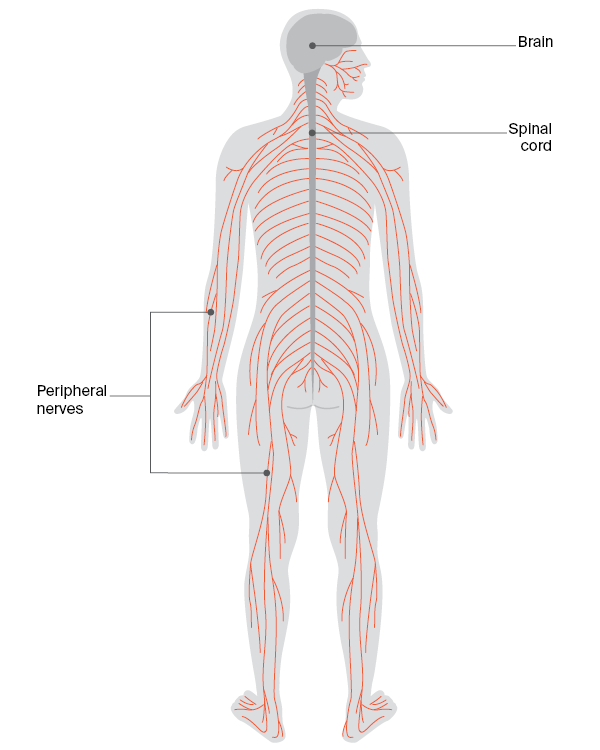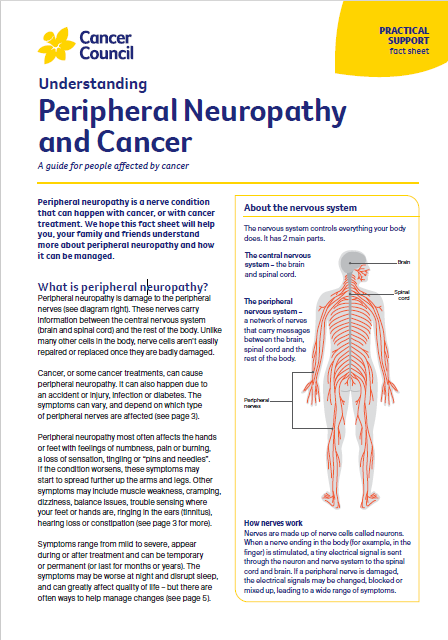- Home
- About Cancer
- Managing side effects
- Peripheral neuropathy
- About peripheral neuropathy
About peripheral neuropathy
Learn about peripheral neuropathy and its symptoms. Discover how cancer or cancer treatment can damage peripheral nerves and learn about the symptoms.
Learn more about:
What is peripheral neuropathy?
Peripheral neuropathy is damage to the peripheral nerves. These nerves carry information between the central nervous system (brain and spinal cord) and the rest of the body. Unlike many other cells in the body, nerve cells aren’t easily repaired or replaced once they are badly damaged.
Cancer, or some cancer treatments, can cause peripheral neuropathy. It can also happen due to an accident or injury, infection or diabetes. The symptoms can vary, and depend on which type of peripheral nerves are affected.
What are the signs to watch for?
Peripheral neuropathy most often affects the hands or feet with feelings of numbness, pain or burning, a loss of sensation, tingling or “pins and needles”.
If the condition worsens, these symptoms may start to spread further up the arms and legs.
Other symptoms may include:
- muscle weakness
- cramping
- dizziness
- balance issues
- trouble sensing where your feet or hands are
- ringing in the ears (tinnitus)
- earing loss
- constipation.
Symptoms range from mild to severe, appear during or after treatment and can be temporary or permanent (or last for months or years). The symptoms may be worse at night and disrupt sleep, and can greatly affect quality of life – but there are often ways to help manage changes.
Learn more about the symptoms of peripheral neuropathy.
About the nervous system
The nervous system controls everything your body does. It has 2 main parts:
- The central nervous system – the brain and spinal cord
- The peripheral nervous system – a network of nerves that carry messages between the brain and spinal cord and the rest of body.

How nerves work
- Nerves are made up of nerve cells called neurons.
- When a nerve ending in the body (for example, in the finger) is stimulated, a tiny electrical signal is sent through the neuron and nerve system to the spinal cord and brain.
- If a peripheral nerve is damaged, the electrical signals may be changed, blocked or mixed up, leading to a wide range of symptoms.
→ READ MORE: Key questions about peripheral neuropathy
Podcast: Coping with a Cancer Diagnosis
Listen now
Dr Fiona Day, Senior Staff Specialist Medical Oncologist, Calvary Mater Newcastle, NSW; James Chirgwin, Senior Physiotherapist – Oncology, Haematology and Palliative Care, The Wesley Hospital, QLD; Kim Kerin-Ayres, Nurse Practitioner Cancer Survivorship, Sydney Cancer Survivorship Centre, Concord Hospital, NSW; Melanie Moore, Lead Exercise Physiology Clinical Supervisor, UC Cancer Wellness Clinic, University of Canberra, ACT; Olivia Palac, Acting Assistant Director, Occupational Therapy, Gold Coast University Hospital, QLD; Danielle Rippin, Consumer; Dr Jane Wheatley, Clinical and Health Psychologist, Department of Pain Medicine, St Vincent’s Health Network, Sydney, NSW.
View the Cancer Council NSW editorial policy.
View all publications or call 13 11 20 for free printed copies.
